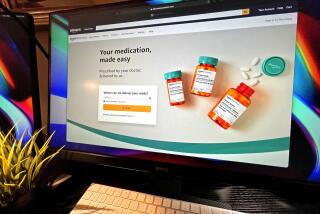Making it easy to comparison shop for prescription drugs
The Internet has already changed how people shop for books, music, cars and a host of other consumer goods. Next up: prescription drugs.
Or so the founders of a Santa Monica start-up called GoodRx are hoping.
“There’s no other site like it that we know of,” said Scott Marlette, a former Facebook employee who’s hoping to hit it big again with his new company. “We wanted to create a product where people can find the best pharmacy to go to.”
GoodRx, based in a modest office building shared with other tech and media companies, has already attracted some big-name investors, including former Disney President Michael Ovitz and a handful of heavyweight venture-capital funds.
The website quietly opened for business in September. After some rejiggering and revamping, its backers say it’s finally ready for prime time.
After kicking GoodRx’s tires, I can say that it works pretty well. You enter your ZIP Code and the drug you’re seeking, and the site quickly comes up with a list of nearby pharmacies and the prices they’re selling the med for — all free of charge.
A search for the cholesterol pill Crestor, for example, revealed that a resident of downtown Los Angeles could find a bottle of 30, 10-milligram tablets at nearby CVS outlets for $130.29; they’d pay $153.97 for the same bottle at Kmart. GoodRx also lets you print out discount coupons before going to the store.
The company says its database contains over 1 million prices at drugstores and mail-order pharmacies nationwide for more than 6,000 brand-name and generic drugs.
GoodRx is pitching itself as a resource for the millions of uninsured people who have to pay full price for medicine, as well as people with insurance who may not realize that they can often find generic meds for less than the cost of their typical co-pay.
“Health is probably the one area of the economy where you rarely ask what the price is up front,” Marlette said. “You just want to get better. But you have choices. And if you know where to get something cheaper, you’d go there.”
The roughly $300-billion pharmaceutical industry in the U.S. is no stranger to the Net. It’s already possible to order meds online (sometimes legally, sometimes not).
But so far, no company has gotten its hands around comparison shopping for the best price at local drugstores — probably because of the difficulty of obtaining data on what various pharmacies are charging.
Marlette said he and GoodRx’s other co-founders, Doug Hirsch and Trevor Bezdek, licked this problem by automating price feeds from a variety of sources, including drugstore chains and discount-coupon providers.
The trick now is making some money off the service.
Hirsch, another former Facebook employee who’s serving as GoodRx’s chief exec, said the site will be looking at selling ads to marketers, as well as “enhanced listings” for drugstores seeking preferential placement.
He also said GoodRx may profit from data provided by users of its “My Prescriptions” service, which will alert you when a prescription should be refilled and also automatically let you know where the cheapest prices can be found.
The idea there would be to target people with specific ads and offers based on information provided about medical conditions and prescriptions.
Facebook and other social networks use a similar approach when marketing to their own users. But this may be a tough sell to consumers when it comes to things like sexually transmitted diseases or antidepressants.
Hirsch said GoodRx would work out these issues down the road. “Our first job is to get customers to trust us,” he said.
Ovitz and other early investors say they trust the company’s leaders to make the venture pay off.
“A lot of our start-up investments are essentially bets on the founders,” Ovitz said. “These are very smart guys with an impressive track record with a great idea.”
There’s clearly a need for greater transparency in healthcare costs, and prescription drugs are an obvious candidate for some sunlight.
Even if you’re well-insured and may not need to comparison shop for meds, it’s good just to be able to see how wide a price disparity exists, particularly for generics, and how much different chains seem to be profiting from their markups.
Perhaps if GoodRx enjoys Facebook- or Twitter-style success, its next step could be to reveal how much different hospitals charge for identical treatments. As it stands, patients can only wonder if they’re getting a reasonable deal or being taken to the medical cleaners.
For that matter, why haven’t health insurers come up with their own price-comparison service? It’s in their interest to provide customers with the most affordable options, and they certainly have access to the most comprehensive data about medical pricing.
Why wouldn’t an Anthem Blue Cross or a Blue Shield want to make customers better healthcare consumers by allowing them to browse for treatments and meds in the same way a savvy consumer will check out the Kelley Blue Book or Google Shopping before buying a car or TV?
Marlette and Hirsch both stand to make small fortunes when Facebook goes public in May. But neither one is ready to throttle down to a lower gear.
“Sure, we want GoodRx to make money,” Hirsch said. “But we started this project as much from a desire for social good.”
At the moment, they seem to be on the right track.
David Lazarus’ column runs Tuesdays and Fridays He also can be seen daily on KTLA-TV Channel 5. Send your tips or feedback to david.lazarus@latimes.com.







